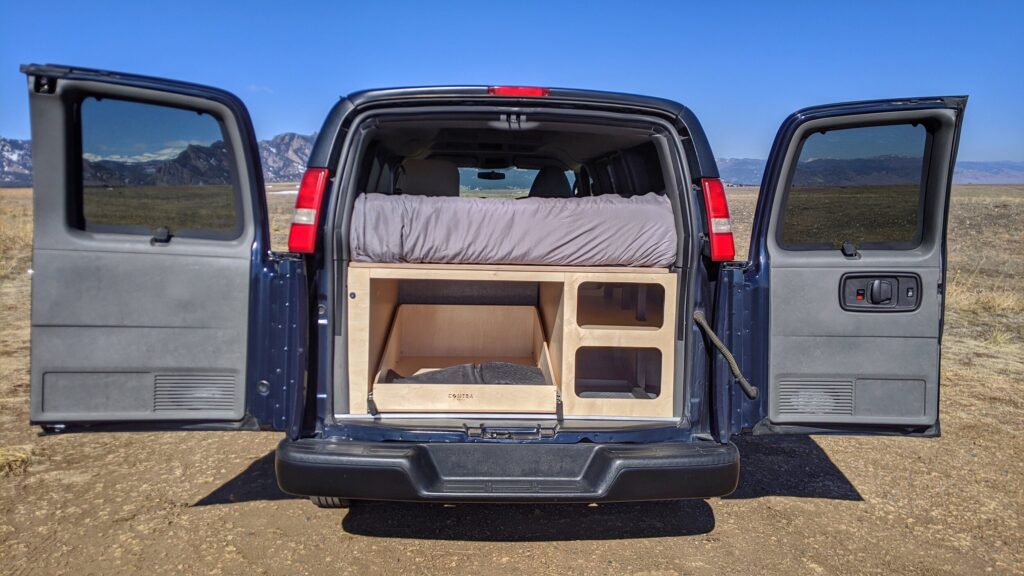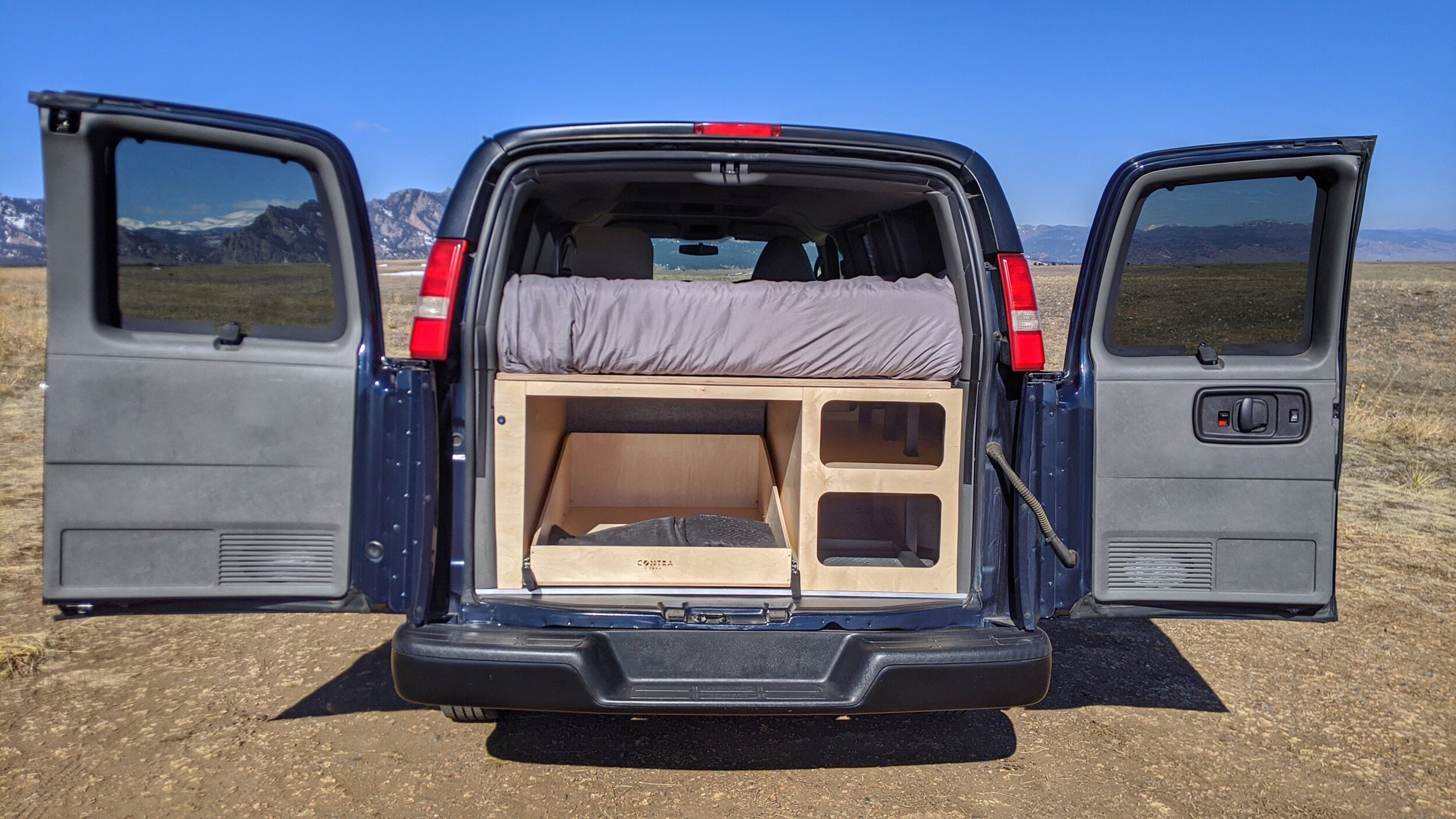
The Ultimate Guide to Chevy Express Camper Van Conversion: Your Adventure Starts Here
The open road beckons, and the allure of a life less ordinary is stronger than ever. For those yearning for freedom, flexibility, and the chance to explore the world on their own terms, the Chevy Express camper van conversion has emerged as a compelling option. This guide delves deep into the world of transforming a Chevy Express van into a fully functional, personalized camper, equipping you with the knowledge to embark on your own adventure.
The Chevy Express, a workhorse in the automotive world, provides a sturdy and reliable foundation for a camper van conversion. Its spacious interior, readily available parts, and established aftermarket support make it a popular choice for both DIY enthusiasts and professional conversion companies. This article will explore everything you need to know, from the initial planning stages to the finishing touches, ensuring you’re well-prepared to create your dream home on wheels. We’ll cover the pros and cons, the essential components, the costs involved, and the crucial steps to a successful Chevy Express camper van conversion.
Why Choose a Chevy Express for Conversion?
The popularity of the Chevy Express camper van conversion is not by chance. Several factors contribute to its appeal:
- Reliability: Chevy Express vans are known for their robust engines and durable build, designed to withstand the rigors of daily use. This reliability translates to fewer breakdowns and more time on the road.
- Spacious Interior: The van’s generous interior dimensions offer ample space for comfortable living, sleeping, and storage, making it ideal for extended trips.
- Affordability: Compared to some other van models, Chevy Express vans are often available at a more budget-friendly price point, both used and new.
- Availability of Parts and Service: The widespread availability of parts and service makes maintenance and repairs relatively easy and cost-effective. You’ll find mechanics familiar with these vans almost anywhere.
- Aftermarket Support: A vast aftermarket industry provides a wide range of conversion components, from basic insulation and flooring to elaborate cabinetry and electrical systems.
Planning Your Chevy Express Camper Van Conversion
Before diving into the physical conversion, meticulous planning is crucial. This phase involves defining your needs, establishing a budget, and creating a detailed design plan. This careful planning will save you time, money, and headaches down the road.
Define Your Needs and Travel Style
Consider how you intend to use your camper van. Will it be for weekend getaways, extended road trips, or full-time living? This will influence your design choices, the components you select, and the overall layout. Think about:
- Sleeping arrangements: Do you need a fixed bed, a convertible sofa bed, or a combination of both?
- Cooking facilities: Will you need a full kitchen with a sink, stove, and refrigerator, or will a more basic setup suffice?
- Bathroom facilities: Will you require a portable toilet, a composting toilet, or a full bathroom with a shower?
- Storage needs: How much storage space do you require for clothing, gear, and food?
- Electrical requirements: How much power will you need for lighting, appliances, and charging devices?
Establish a Budget
Chevy Express camper van conversion costs can vary significantly depending on the scope of the project and the quality of the components. Set a realistic budget that includes the cost of the van itself, conversion materials, labor (if applicable), and any unforeseen expenses. Research the costs of various components to get a clear understanding of the financial implications.
Create a Design Plan
Once you’ve established your needs and budget, create a detailed design plan. This plan should include:
- Layout: Sketch out the layout of your van, including the placement of the bed, kitchen, seating area, and other features. Consider the flow of movement within the van.
- Components: List all the components you’ll need, such as insulation, flooring, cabinets, appliances, electrical wiring, and plumbing.
- Materials: Specify the materials you’ll use for each component, such as wood for cabinetry, fabric for upholstery, and insulation for the walls and ceiling.
- Electrical and Plumbing Diagrams: Create detailed diagrams of your electrical and plumbing systems to ensure proper installation and functionality.
Essential Components for Your Conversion
A successful Chevy Express camper van conversion requires careful selection and installation of several key components. Here’s a breakdown of the essentials:
Insulation
Proper insulation is crucial for temperature regulation, noise reduction, and moisture control. Common insulation materials include:
- Spray foam: Offers excellent insulation and air sealing.
- Rigid foam: Easy to install and provides good insulation.
- Reflective insulation: Reflects radiant heat and can be used in combination with other insulation materials.
- Fiberglass or mineral wool: Effective for sound dampening, but can be more susceptible to moisture.
Flooring
Choose flooring that is durable, easy to clean, and water-resistant. Popular options include:
- Vinyl plank flooring: Affordable, water-resistant, and easy to install.
- Laminate flooring: Offers a stylish look and is relatively easy to maintain.
- Rubber flooring: Durable, slip-resistant, and ideal for wet environments.
Electrical System
A reliable electrical system is essential for powering lights, appliances, and charging devices. Key components include:
- Batteries: Deep-cycle batteries (lithium or AGM) provide power for your appliances.
- Solar panels: Generate electricity from the sun, reducing your reliance on shore power.
- Inverter: Converts DC power from the batteries to AC power for appliances.
- Wiring: Use appropriate gauge wiring for all electrical connections.
- Charge controller: Regulates the charging of your batteries from solar panels or the alternator.
Plumbing System
If you plan to have a sink, shower, or toilet, you’ll need a plumbing system. Key components include:
- Fresh water tank: Stores fresh water for drinking and washing.
- Grey water tank: Collects wastewater from the sink and shower.
- Water pump: Provides water pressure for your faucets and shower.
- Pipes and fittings: Use PEX or other suitable plumbing materials.
- Water heater: Provides hot water for your shower and sink.
Ventilation
Proper ventilation is essential to prevent moisture buildup and maintain air quality. Consider:
- Roof vents: Allow for natural airflow and exhaust cooking odors.
- Windows: Provide ventilation and natural light.
- Fans: Help circulate air and remove moisture.
Furniture and Storage
Choose furniture and storage solutions that are functional, space-saving, and aesthetically pleasing. Consider:
- Beds: Choose a bed size that suits your needs, and consider a convertible sofa bed for added versatility.
- Cabinets: Provide ample storage for clothing, food, and gear.
- Seating: Consider a bench seat or swivel seats for a comfortable living area.
- Tables: Provide a surface for eating, working, and playing games.
The Conversion Process: Step-by-Step
The Chevy Express camper van conversion process can be broken down into several key steps:
Preparation
Begin by cleaning the van thoroughly and removing any existing interior components. Then, prepare the surfaces for insulation and wiring by:
- Rust removal and treatment: Address any rust issues to prevent further damage.
- Surface cleaning: Ensure all surfaces are clean and free of debris.
- Wire routing: Plan the routing of your electrical wiring.
- Insulation installation: Install your chosen insulation material.
Framing
Build a frame for your walls, ceiling, and furniture. This frame provides a structure to which you can attach the interior components. Consider:
- Wood framing: Easy to work with and readily available.
- Metal framing: More durable and fire-resistant.
- Attaching the frame: Securely attach the frame to the van’s structure.
Electrical and Plumbing Installation
Install the electrical and plumbing systems according to your design plan. This includes:
- Wiring: Run the wires and connect the components.
- Plumbing: Install the water tanks, pump, and other plumbing components.
- Testing: Test the electrical and plumbing systems for proper functionality.
Interior Finishing
Install the flooring, walls, ceiling, and furniture. This involves:
- Flooring installation: Install your chosen flooring material.
- Wall and ceiling panels: Attach the wall and ceiling panels to the frame.
- Cabinetry installation: Install the cabinets and other furniture.
- Appliance installation: Install the appliances, such as the refrigerator, stove, and sink.
Final Touches
Add the finishing touches to personalize your van, such as:
- Upholstery: Cover the furniture with fabric or other materials.
- Lighting: Install lighting fixtures throughout the van.
- Accessories: Add any accessories, such as curtains, blinds, and decorative items.
Cost Considerations for Your Chevy Express Camper Van Conversion
The cost of a Chevy Express camper van conversion can vary widely, but here’s a general breakdown:
- Van Purchase: The cost of a used Chevy Express van can range from $5,000 to $25,000 or more, depending on its condition, mileage, and year.
- Insulation and Sound Deadening: $500 to $2,000.
- Flooring: $300 to $1,000.
- Electrical System: $1,000 to $5,000 or more, depending on the size and complexity.
- Plumbing System: $500 to $2,000.
- Appliances: $500 to $3,000 or more, depending on the appliances you choose.
- Furniture and Cabinetry: $1,000 to $10,000 or more, depending on whether you build or buy pre-made components.
- Labor (if applicable): If you hire a professional conversion company, labor costs can significantly increase the overall cost.
DIY vs. Professional Conversion: A DIY conversion can save you money but requires time, skills, and access to tools. Hiring a professional conversion company will be more expensive but can provide a higher-quality result and save you time.
Tips for a Successful Chevy Express Camper Van Conversion
Here are some tips to help you succeed with your Chevy Express camper van conversion:
- Research Thoroughly: Before you start, research different conversion ideas, components, and techniques. Watch videos, read blogs, and join online forums.
- Plan Meticulously: A well-defined plan will save you time, money, and frustration.
- Take Your Time: Don’t rush the process. Take your time and do things right the first time.
- Use Quality Materials: Invest in high-quality materials and components to ensure durability and longevity.
- Seek Expert Advice: Don’t be afraid to ask for help from experienced DIYers or professional conversion companies.
- Safety First: Prioritize safety throughout the conversion process. Wear appropriate safety gear and follow all safety guidelines.
- Test and Refine: Test all systems thoroughly before hitting the road. Be prepared to make adjustments and refinements as needed.
Finding the Right Chevy Express for Your Conversion
When choosing a Chevy Express for your Chevy Express camper van conversion, consider the following factors:
- Year: Newer models often have more features and better fuel efficiency, but older models can be more affordable.
- Mileage: Choose a van with low mileage to minimize the risk of mechanical problems.
- Condition: Inspect the van thoroughly for rust, mechanical issues, and other problems.
- Wheelbase: The standard wheelbase is often preferred for easier maneuverability, but the extended wheelbase offers more interior space.
- Roof Height: Consider the roof height when planning your conversion. A high-top roof provides more headroom but can increase the cost and complexity of the conversion.
- Engine: Choose an engine that suits your needs. The V6 and V8 engines are both reliable and offer good performance.
Embrace the Adventure: Your Chevy Express Camper Van Awaits
Converting a Chevy Express van into a camper is a rewarding project that opens up a world of possibilities. With careful planning, the right components, and a willingness to learn, you can create a personalized adventure vehicle that allows you to explore the world on your own terms. The joy of a Chevy Express camper van conversion lies not only in the finished product but also in the journey of creating it. So, embrace the adventure, start planning your conversion, and get ready to hit the open road!
[See also: Related Article Titles]


